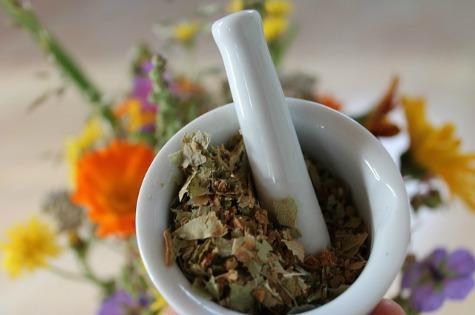We can often feel trapped inside a cycle of stress but there are ways to keep a little calm,
Fusion Health Naturopath Erika Morvay explains.
Various modern-day stressors can have a major influence on our mood, sense of wellbeing, health and behaviour. 1 Sometimes it can be difficult to avoid stress, but we can influence how it affects us.
Here are my favourite ways of managing the effects of stress, naturally:
Herbal Medicine unlocks age-old secrets
Holy Basil, also known as Sacred Basil, has been used in Ayurvedic medicine for thousands of years and is known as ‘Queen of Herbs’ in India where it is grown outside most homes and worshipped daily. 3 Holy Basil has been used to help manage symptoms of stress such as mild anxiety, irritability, restlessness, tiredness, poor concentration, forgetfulness and stress‐related sleep disturbance 2 while Withania, sometimes called Winter Cherry or by its Sanskrit name Ashwagandha, is traditionally used to help manage symptoms of stress, mild anxiety, and insomnia. 2, 4
Laboratory studies have also shown that honokiol and magnolol, active constituents of Magnolia Bark may be beneficial for the symptoms of mild anxiety. 2 Magnolia Bark is commonly used in Traditional Chinese Medicine for symptoms of stress, especially if accompanied with digestive upset, abdominal pain, nausea, poor appetite, constipation or diarrhoea. 2
Nutritional Supplements for a healthy nervous system and adrenal function
B-complex vitamins are involved in maintaining a healthy nervous system 5 and adrenal glands. When under a lot of stress, the body utilises high amounts of these nutrients and it may be beneficial to supplement with a high strength B-complex formula.
Surprisingly the adrenal glands are among the organs with the highest concentration of vitamin C in the body. 6 If you are not getting enough of this essential nutrient through your daily diet, choose a formula with a non-acidic form of vitamin C such as calcium or sodium ascorbate, which is gentler on the stomach.
Magnesium supports healthy nervous system function and may be beneficial during times of stress and may help relieve sleeplessness. 7 Opt for a supplement containing organic forms of magnesium, such as magnesium glycinate, for enhanced absorption and gastrointestinal tolerance.
Omega-3 fatty acids are an integral part of cell membranes throughout the body and affect the function of the cell receptors in these membranes 9 supporting normal function of all body systems, including healthy mood balance. 8 These fats are essential, meaning the body can’t manufacture them, and therefore we must get them from diet. Opt for a formula sustainably sourced and tested for heavy metals, polychlorinated biphenyls (PCB’s) and dioxins.
Eat and Sleep for a better daily stress response
What you eat plays a major role in how you feel and how well your body responds to stress. Focus on eating varied, real food to help support your body while trying to avoid processed foods, sugar, white flour products and reducing caffeine and alcohol, which can put additional stresses on the body.
Research by the Sleep Health Foundation has found 33 to 45 per cent of Australian adults sleep either poorly or not long enough most nights, leaving them to face the new day with fatigue, irritability and other side effects of sleep deprivation. 11
Lack of sleep also makes it very difficult to cope with various stressors, but long-term stress can also affect the quality of your sleep. Getting at least 7-8 hours of good quality sleep helps your body to recover, heal and cope with any stress more effectively.
Mindfulness means taking care of you
It’s as simple as breathe in, breathe out. Daily abdominal breathing techniques may help reduce anxiety and reduce stress as this type of deep breathing increases the supply of oxygen to your brain and stimulates the parasympathetic nervous system, which promotes a state of calm. 10
You can significantly manage your stress levels by changing your perception of the situation you find difficult to handle. This requires thought awareness and practice, but it can result in a calmer and more peaceful life.
And finally, reduce stress where you can by learning to say no to demanding projects that you can’t handle, and people or situations that stress you out.
References:
- Schneiderman, Neil, Gail Ironson, and Scott D. Siegel. “STRESS AND HEALTH: Psychological, Behavioral, and Biological Determinants.” Annual review of clinical psychology 1 (2005): 607–628. PMC. Web. 2 Aug. 2017
- Evidence review Stress & Anxiety
- Dabur Research Foundation, Major Herbs of Aurveda, 2002
- Premila, M.S, Ayurvedic Herbs, 2006
- Evidence Review Stress B Multi
- Patak P1, Willenberg HS, Bornstein SR.Vitamin C is an important cofactor for both adrenal cortex and adrenal medulla.Endocr Res. 2004 Nov;30(4):871-5. PMID: 15666839
- Evidence Review Magnesium Advanced
- Evidence Review OceanPure Fish Oil
- https://www.hsph.harvard.edu/nutritionsource/omega-3- fats/ last visited 7/8/17
- https://www.stress.org/take-a- deep-breath/ last visited 7/8/17
- https://www.sleephealthfoundation.org.au/848-sleepiness- epidemic-hits- nation.html last visited 7/8/17

















__small.png)










